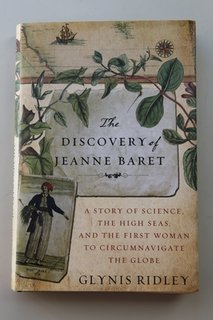
04 Jan 2011 23:41:28
In writing "The Discovery of Jeanne Baret," Ridley places her subject in the larger context of French society and government and Enlightenment attitudes about the role of women in the world of science.
Baret took extreme measures to be a part of that world. Raised in poverty in rural France in the mid-18th century, she was trained by "herb women," country folk with knowledge of medicinal plants. That led to a chance meeting with botanist Philibert Commerson. Hired to keep house, she became his scientific collaborator and his mistress.
The depth of their professional relationship was as secret as their love affair. When naval commander Louis-Antoine de Bougainville set out in 1766 to circumnavigate the globe, Commerson was the lead naturalist. To accompany him in spite of a royal edict forbidding women aboard the king's ships, Baret disguised herself as a young man and signed on as Commerson's valet and assistant.
Their voyage was hardly the stuff of romantic comedy. Her pretense came with constant physical pain. She suffered eczema under the tight linen bindings that held down her breasts, and her constricted lungs strained as she climbed hills bearing the botanist's gear. The fear of being found out, and possibly raped, was constant.
She quieted rumors of gender-bending by claiming to be a eunuch, thus putting off those sailors who feared such a fate or pitied such a creature. Exactly when and how her secret became widely known is a subject of debate and conjecture.
The book's title alludes to what Baret herself helped to discover, among other things the vine that bears Bougainville's name. She received no credit for her efforts, of course, and journals from the expedition dismissed her as little more than an impressive "beast of burden," though she was so much more.
Ridley, an English professor at the University of Louisville, ably weaves facts with inferences in revealing this unsung figure. In her hands, discovering Jeanne Baret becomes a splendid example of how to explore the past and bring it to life.
Baret took extreme measures to be a part of that world. Raised in poverty in rural France in the mid-18th century, she was trained by "herb women," country folk with knowledge of medicinal plants. That led to a chance meeting with botanist Philibert Commerson. Hired to keep house, she became his scientific collaborator and his mistress.
The depth of their professional relationship was as secret as their love affair. When naval commander Louis-Antoine de Bougainville set out in 1766 to circumnavigate the globe, Commerson was the lead naturalist. To accompany him in spite of a royal edict forbidding women aboard the king's ships, Baret disguised herself as a young man and signed on as Commerson's valet and assistant.
Their voyage was hardly the stuff of romantic comedy. Her pretense came with constant physical pain. She suffered eczema under the tight linen bindings that held down her breasts, and her constricted lungs strained as she climbed hills bearing the botanist's gear. The fear of being found out, and possibly raped, was constant.
She quieted rumors of gender-bending by claiming to be a eunuch, thus putting off those sailors who feared such a fate or pitied such a creature. Exactly when and how her secret became widely known is a subject of debate and conjecture.
The book's title alludes to what Baret herself helped to discover, among other things the vine that bears Bougainville's name. She received no credit for her efforts, of course, and journals from the expedition dismissed her as little more than an impressive "beast of burden," though she was so much more.
Ridley, an English professor at the University of Louisville, ably weaves facts with inferences in revealing this unsung figure. In her hands, discovering Jeanne Baret becomes a splendid example of how to explore the past and bring it to life.

